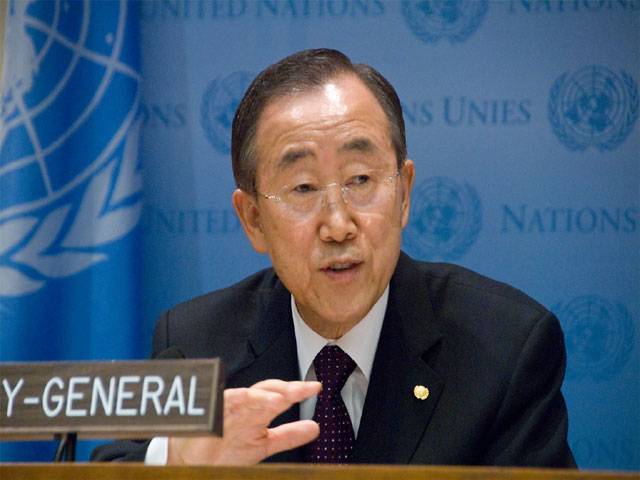UNITED NATIONS - Secretary-General Ban Ki-moon is “dismayed” over the turn of events following his invitation to Iran to participate in the peace conference on Syria, which led to Syrian opposition’s boycott threat, and is currently holding “intensive and urgent” discussions to overcome the problem, his spokesman said Monday.
“Intensive and urgent discussions are underway and he (Ban) will have more to say about the situation later in the day,” Spokesman Martin Nesirky told the regular noon briefing at UN Headquarters in New York. The spokesman said the secretary-general is “considering his options”.
The United States jumped in to say that it was caught unawares by the move to invite Iran, an ally of Syrian President Bashar al-Assad, and demanded that the invitation should be withdrawn unless Iran explicitly states its support for a transitional government “with full executive authorities.”
But replying to questions, Nesirky said the invitation to Iran was no surprise as American officials knew about it. He also expressed the secretary-general’s disappointment with Iran’s response following the receipt of the invitation to attend the conference, which is to take place on January 22.
While accepting the invitation, Iran’s foreign ministry spokesperson rejected the imposition of any preconditions, seeming to contradict a statement by Ban that he had been privately assured by Iranian officials that they welcomed the ground rules for the conference to establish “by mutual consent” a transitional body to govern Syria.
While promising to make a statement later in the day, the UN chief told the Security Council, “For the moment, let me just appeal again to all involved to keep the needs of the Syrian people foremost in mind.”Iran and Russia are the main foreign backers of President Assad and Tehran’s presence has been one of the most contentious issues looming over the first talks attended by both Assad’s government and opponents. Russian UN Ambassador Vitaly Churkin also disputed western suggestions that the decision to invite Iran was made hastily. Asked if Ban had consulted Russia and the United States in advance, Churkin remarked, “Of course, everybody was consulted.”
British UN Ambassador Mark Lyall Grant told reporters before the Security Council meeting on the Middle East Situation that Iran must explicitly and publicly embrace a plan for a political transition in Syria that was agreed in June 2012 at an international conference in Geneva if it was to attend the so-called “Geneva 2” talks.
The United States went a step further, saying it expects Ban to withdraw his invitation to Iran to attend Geneva 2 unless Tehran fully supports the June 2012 agreement on creating a transitional government for Syria - which Washington says would be without Assad.
Ban announced Sunday night that after “intensive” meetings and telephone conversations with many global leaders and others who are part of the diplomatic effort on Syria, he has decided to also invite Iran together with Australia, Bahrain, Belgium, Greece, the Holy See, Luxembourg, Mexico, the Netherlands and the Republic of Korea to the 22 January opening gathering in Montreux, near Geneva.
“I believe the expanded international presence on that day will be an important and useful show of solidarity in advance of the hard work that the Syrian Government and opposition delegations will begin two days later in Geneva,” he added, stressing that he believes strongly that Iran needs to be part of the solution to the Syrian crisis.
Well over 100,000 people have been killed and more than 8 million others driven from their homes since the conflict erupted in March 2011 between the Government and various groups seeking the ouster of President Bashar al-Assad. More than 30 other countries and organizations, including the Security Council’s five permanent members had already been invited to the conference last month.
Tuesday, April 16, 2024
Efforts on to rescue Syria talks: UN

Caption: Efforts on to rescue Syria talks: UN
3:25 PM | April 16, 2024
1:17 PM | April 16, 2024
IHC dismisses Bushra Bibi's plea seeking her shifting to Adiala Jail from Bani Gala
4:25 PM | April 16, 2024
Punjab CM visits Tehsil Headquarter Hospital Murree
3:25 PM | April 16, 2024
High-level Saudi delegation in Islamabad to hold meetings with Pakistani leadership
2:07 PM | April 16, 2024
Saudi foreign minister meets PM Shehbaz Sharif
1:17 PM | April 16, 2024
Decision to retaliate against Iran attacks rests with Israel, says Pentagon
1:05 PM | April 16, 2024
Political Reconciliation
April 16, 2024
Pricing Pressures
April 16, 2024
Western Hypocrisy
April 16, 2024
Policing Reforms
April 15, 2024
Storm Safety
April 15, 2024
Democratic harmony
April 16, 2024
Digital dilemma
April 16, 2024
Classroom crisis
April 16, 2024
Bridging gaps
April 16, 2024
Suicide awareness
April 15, 2024
ePaper - Nawaiwaqt
Advertisement
Nawaiwaqt Group | Copyright © 2024





